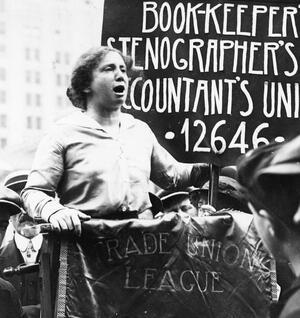Rose Schneiderman
Rose Schneiderman was born in Poland on April 16, 1882. Her parents, Samuel and Deborah, believed strongly in education for girls and sent Rose first to heder [religious school] and then to public school. In 1890, the family immigrated to New York City. When Samuel died two years later, Deborah did everything she could to support her children, but she was forced to place them in an orphanage temporarily. When Rose returned from the orphanage, her mother worked nights so she could attend school during the days. But when Deborah lost her job, thirteen-year-old Rose left school to find work.
For three years, Schneiderman worked as a salesgirl. But department store work, while considered more respectable than factory work, was badly paid, and Schneiderman eventually became a cap maker instead. Although she earned more than as a salesgirl, wages were still low and working conditions poor, and Schneiderman became interested in the labor movement. Convinced that unions could help the working class, she organized her workplace into a branch of the United Cloth Hat and Cap Makers' Union. At first skeptical that a woman could organize other workers, male union leaders were impressed by Schneiderman. Though only four feet nine inches tall, she could command the attention of a crowd with her powerful speaking skills. She soon became the first woman elected to national office in an American labor movement.
While leading a cap makers' strike, she became involved with the New York Women's Trade Union League (NYWTUL), founded by middle-class women to help working women unionize. By 1906, she had become vice president of the NYWTUL, and in 1908 she began working as the League's chief organizer, focusing on New York City's garment workshops. Schneiderman’s organizing work helped pave the way for the "Uprising of the 20,000," a large general strike by garment workers (mostly young women, majority Jewish) in 1909-1910 that proved women could be effective union members.
Schneiderman was also an influential figure in the activism following the tragedy of the Triangle Shirtwaist factory fire, which killed 146 garment workers (mostly young Jewish immigrant women) on March 25, 1911. The scale of the tragedy provoked widespread grief and outrage. In a speech she gave at a meeting protesting the fire, Schneiderman expressed her anger that the lives of working people were not valued more and held citizens accountable for the poor conditions of workers' lives. Responses to the fire such as Schneiderman's led to the creation of more effective fire and safety regulations for the workplace.
Schneiderman's skills brought her to a statewide and then national stage. In the years before women got the right to vote, she played a key role in the New York State suffrage campaign. In 1920, she ran for the US Senate on the Labor Party ticket. Though she did not win, her campaign brought attention to the needs of working people. Schneiderman became a nationally-known figure and was both a personal friend of and political influence on Franklin and Eleanor Roosevelt, serving as the only woman on the National Labor Advisory Board and helping to shape New Deal legislation. In 1937, she took the post of Secretary of Labor for New York State.
Schneiderman always remained connected to her Jewish roots, and was particularly active during the late 1930s and 1940s in the efforts to rescue Jewish refugees from Europe and resettle them in the US and in Palestine.
Rose Schneiderman never married, but she did form close and loving relationships with several other women prominent in the labor movement. She died in 1972, at age 90.
This biography is adapted from Annelise Orleck’s article on Rose Schneiderman in Jewish Women: A Comprehensive Historical Encyclopedia.



